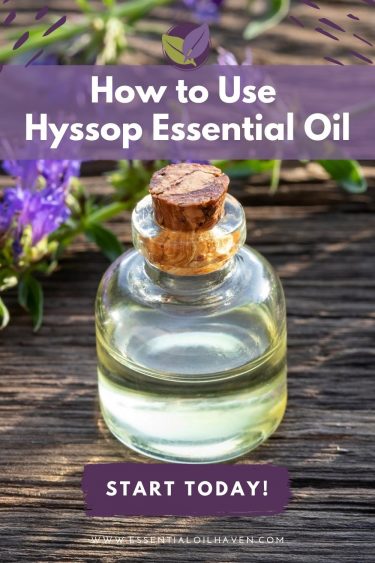
Hyssop essential oil is a mild and gentle smelling, flowery yet herbacious aromatherapy oil. Among others, it is used in skin care, respiratory care, and to help regulate blood pressure.
If you’ve never heard of Hyssop, or are curious about the oil and its best uses, this article is for you!
This post contains affiliate links, which means if you make a purchase through these links, I may receive a small commission at no extra cost to you. Read my full disclosure policy here.
I’ll quickly explain the Hyssop plant, and then show you the 5 best ways to use Hyssop essential oil.
I also have tips for blending Hyssop, how to use it safely, and where to buy the best, most authentically sourced Hyssop at a great price.
Ready to learn about Hyssop with me? Let’s dive in!
What Is Hyssop Essential Oil?
Hyssop essential oil (Hyssopus officinalis) is made through steam distilling the leaves and flowers of the Hyssop plant. The plant itself belongs to the mint genus, while the leaves and flowers resemble lavender.
When Hyssop is grown among other plants, it’s said to prevent bacterial invasions ¹. This protective nature of the plant translates into its essential oil.
During biblical times, Hyssop was considered a holy plant. The herb was used in a spiritual function to purify and protect ².
Hyssop offers a fresh and floral scent. Many find that it creates a really pleasant fragrance.
Hyssop essential oil has been used for centuries in traditional Chinese, Eastern and Indian medicine to treat a wide variety of different ailments and conditions.
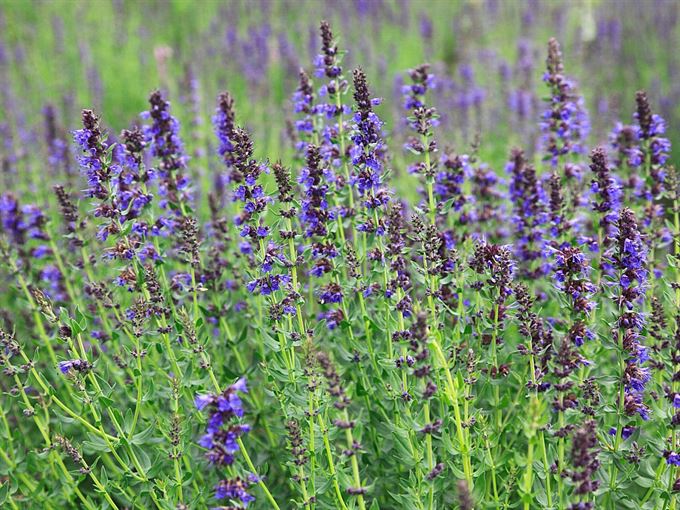
Hyssop plants look a lot like Lavender with small purple flowers and tall green stems.
Top 5 Uses For Hyssop Essential Oil
Hyssop has been used for centuries as an antiseptic. It is deemed one of the strongest antiviral essential oils available ³. Many people believe that it has healing and medicinal value and use it for many skin conditions including sunburn, psoriasis, ringworm, and diaper rashes.
There are many benefits to using Hyssop essential oil! Here are the top 5:
1. Soothe Skin Inflammation and Reduce Itching
The most obvious form of treatment is using the oil on the skin. Hyssop can be applied for dry skin to help soothe inflammation and reduce itching. A few drops on a cotton ball will often be all you need to soothe your irritated skin. For the best results try applying a small amount, blended with a carrier oil, directly to the affected area.
2. For Cuts, Wounds and Scars
Hyssop is an excellent treatment for minor skin irritations, cuts and other wounds. With its antiseptic properties, it can prevent the wound from becoming infected. It can also aid skin healing and minimize the appearance of scars. Hyssop is an effective treatment for dandruff as well. It can reduce scalp itchiness and minimize the occurrence of dandruff.
3. Alleviates Respiratory Symptoms
Aromatherapy is a natural therapy that involves the use of scents to heal and alleviate certain types of illnesses. If you have been told that Hyssop has a bitter scent, rest assured that it is not bitter at all.
Hyssop can aid respiratory problems such as colds, cough and flu. With its antibacterial and antiviral properties, it is an excellent support to the respiratory systems. It has been used as a home remedy for cough, cold, sore throat, as well as asthma 4.
4. Can Help Regulate Blood Pressure
Hyssop essential oil benefits come in several forms. Some of these benefits are found inside the body.
An article on www.prohealth.com, titled “Help Your Body Heal With Hyssop Oil”, written by Dr. Mercola, mentioned that Hyssop oil can be very beneficial when used to address low blood pressure or hypotension. CAUTION: Do not use Hyssop if you have hypertension or have epilepsy. Also don’t use it if you are pregnant. Always consult your doctor or medical professional prior to any aromatherapy use if you have any medical conditions, or are using prescription medications.
5. Calming of Nerves and Muscles
Hyssop essential oil benefits also include the calming of the nerves and muscles. For this reason it is often used to relax tense and relax muscles during a massage. It can be used on the back, neck, shoulders, hands, feet, and elbows to relieve tightness and soreness.
Using Hyssop Oil Safely
Topical Use
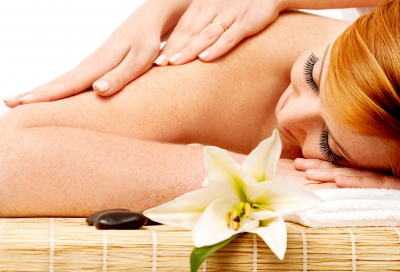
Essential oils massage therapy is one of the most relaxing experiences.
Start with about 1 teaspoon of carrier oil into the palm of your hand. Carrier oils are oils like Almond oil, Coconut oil, or Olive oil. Add 2 drops of Hyssop essential oil. This will yield a dilution rate of approximately 2%, which is safe for healthy adults.
Apply the diluted oil mixture onto the sore spots of your body. You can use an aromatherapy oil a few times per day as needed. But don’t over use it!
Never apply essential oils directly onto the skin. Always dilute them with a carrier oil first. Also, always avoid the eyes, nose, and other sensitive body areas.
Bath
Essential oils add a wonderful aromatherapy aspect to a hot bath. Add 2-3 drops to your running bath water and swirl around to blend it in. Be careful getting in and out of the tub as the oil can make the surface slippery. For an additional detoxification boost, also add 1 tbsp of Epsom Salts to your bath.
Inhalation or Diffusing
Enjoy Hyssop essential oil benefits through simple and safe ways of inhalation. This includes a hot steam bowl, sniffing the essential oil through a personal inhaler, or using a piece of aromatherapy jewelry to surround yourself with the Hyssop scent all day long.
You may also wish to use your electronic essential oil diffuser to scent the room of your house. Small ultrasonic diffusers can make an essential oil mist all day long.
Side Effects
If you notice any skin irritation such as redness, rash, or excessive itching, stop usage of the essential oil immediately. Other side effects may include shortness of breath or wheezing. Contact your nearest emergency center right away.
For safe topical application, do a skin patch test first. Apply the diluted oil onto a small skin area first, such as the inside of your elbow. Wait 24 hours and observe the skin for any reactions. If no reaction occurs, it is safe to use the oil on larger topical areas.
Blending Hyssop Essential Oil
Hyssop is very easy to blend with other oils or essences to create a fragrance that tastes pleasant.
In aromatherapy, blending essential oils is both an art and a science. Each essential oil is assigned either a top, middle, or base note depending on the oil’s chemical composition.
- Hyssop is a middle note. This means, it blends well with other middle notes such as Geranium or Orange.
- It also blends well with other mint-y and citrus-y fragrances such as Peppermint, Spearmint, Lemon, Mandarin, Lavender.
- Hyssop blends well with Eucalyptus, and other camphoraceous aromas such as Clary Sage, Rosemary or Bay.
- Therapeutically, you can blend it well with other skin-soothing oils such as Helichrysum or Frankincense.
My personal Hyssop blend includes Lavender, Hyssop, Frankincense and Helichrysum. I use it as a skin-healing tonic.
Where To Buy The Best Hyssop Oil
Hyssop is native to the area ranging from southern Europe eastward to Central Asia 5.
Most Hyssop essential oil is sourced from hot, sunny countries such as Spain, Italy, and France. The following reputable essential oil companies offer a sustainably sourced Hyssop oil that I can recommend:
- Mountain Rose Herbs: Hyssop essential oil, sourced & distilled in Spain, $12.75 for a 15 ml bottle, currently 25% off for the month of September
- Edens Garden: Hyssop essential oil, sourced from France, $16.95 for a 10 ml bottle
- REVIVE: Hyssop essential oil, sourced from Spain, $17 for a 10 ml bottle
Final Thoughts
If you’ve never tried Hyssop essential oil yet, I hope I was able to inspire you to give it a try. It is a wonderful oil with mild, balanced effects. It performs well and is friendly in a blend. Order your Hyssop today and try it out for yourself.
References
¹ The Complete Book of Essential Oils and Aromatherapy, Valerie Ann Worwood, p. 507.
² Experience-Essential-Oils.com: https://www.experience-essential-oils.com/hyssop-uses.html
³ ProHealth.com: https://www.prohealth.com/library/help-your-body-heal-with-hyssop-oil-7264
4 VeryWellHealth.com: https://www.verywellhealth.com/hyssop-benefits-4588178
5 https://www.britannica.com/plant/hyssop


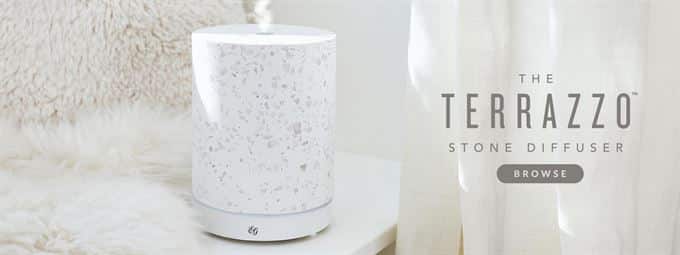
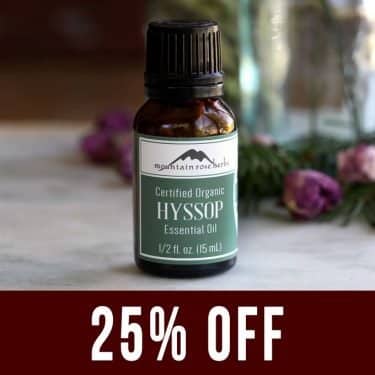
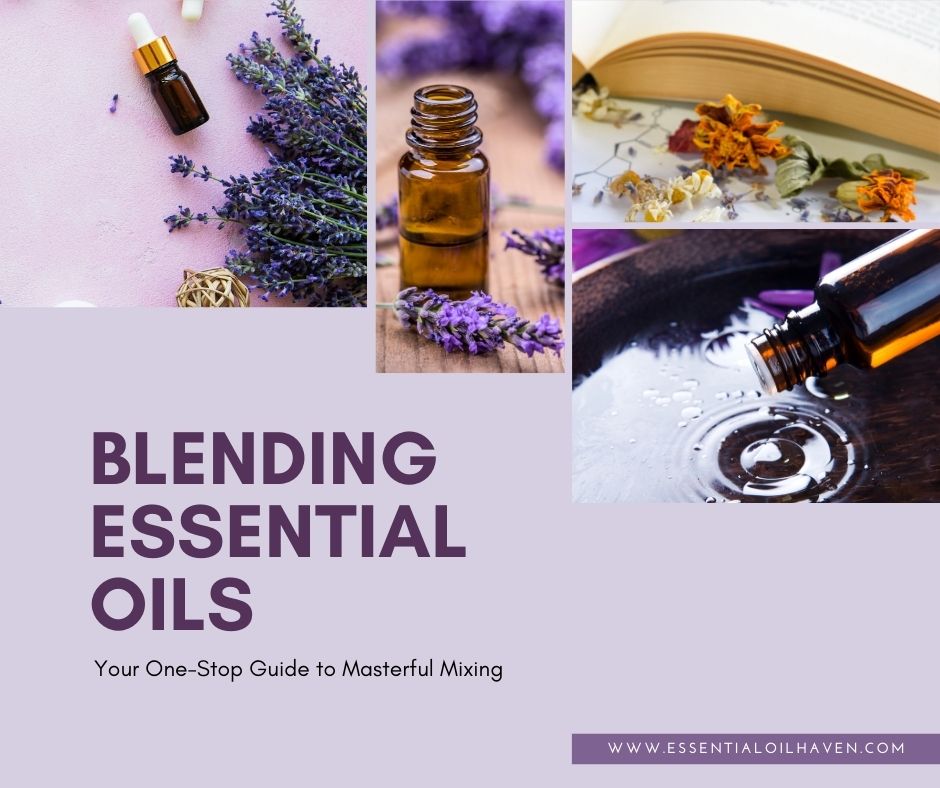
How can I use Hyssop essential oil in a tea? How much would I use?
Hi Sherry, I am sorry I cannot help you with that question. I do not advocate for internal use of essential oils at all. Here are the reasons why.